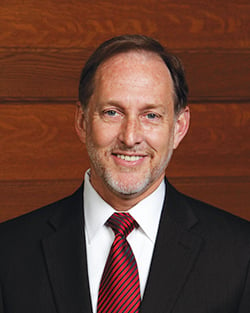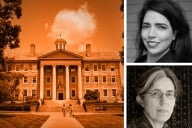You have /5 articles left.
Sign up for a free account or log in.
 Leaders of the board of Hope College have moved away from a plan to fire President John Knapp immediately. Board members are divided about whether to oust Knapp, sources aware of their discussions said, but those who want to do so have pulled back amid growing publicity about their move to get rid of a leader with strong backing from students, professors and alumni.
Leaders of the board of Hope College have moved away from a plan to fire President John Knapp immediately. Board members are divided about whether to oust Knapp, sources aware of their discussions said, but those who want to do so have pulled back amid growing publicity about their move to get rid of a leader with strong backing from students, professors and alumni.
On Friday, hundreds of students and faculty members gathered at a central meeting point on campus and sat down in silence, saying they were demonstrating support for Knapp and frustration at the move to oust their president.
At around the same time, the board chair, Mary Bauman, sent her fellow trustees an email -- which was leaked to Inside Higher Ed -- that confirms the fears of many on campus that a move was afoot to fire Knapp. The email indicates that board leaders have pulled back from that plan for now but will resume discussions about his future next month.
The email, in its entirety, says: "The executive committee has discussed the feedback received during the informational meeting on Tuesday, April 12, and we unanimously agree to withdraw our motion to recommend the termination of John Knapp’s contract as president of Hope College. Our rationale for doing so at this time is that we believe it is in the best interests of the institution as a whole and because we are concerned about the health and unity of the board. However, we continue to be unanimous in our serious concerns about John Knapp’s performance as president.
"By withdrawing the motion we are slowing this process down and can take more time for discussion, as was requested by some of our board members. Other than any essential business which may need to come before the board at our May 5-6 meeting, we plan to devote the balance of the meeting to the discussion of this critical issue in order to provide information, answer questions and together move forward to bring resolution. I understand this has been a difficult period, made more so as confidential discussions have been shared beyond board membership. Thank you for your input and ideas thus far, and please remember that past and future deliberations as a board are to be held in strictest confidence. I look forward to your continued engagement as we move ahead."
Bauman referred a request for comment about why board members are concerned about Knapp to a college spokeswoman. The spokeswoman said Knapp was not commenting and that communications from board members were "private and confidential."
Knapp walked by the student protest Friday, waved and did not say anything. He did send an email to the campus the same day. "I recognize that this is a challenging time for the Hope community as many have become aware that leaders of the college are seeking to resolve some disagreements. This process is ongoing, but please rest assured that everyone concerned is aware that uncertainty has heightened anxiety on our campus," Knapp wrote.
"I am also aware that there has been speculation about the departure of Provost Rich Ray. Let me reiterate that my request for the provost to step down was about a need for new leadership for Hope's academic program. My decision was not based on any differences of opinions on social or religious issues. I also would like to restate my gratitude to Provost Ray for his years of service in the college’s leadership."
The delay in the discussion and vote will give more time for Knapp's supporters to lobby trustees -- something backers are doing through social media, a petition and private outreach. But a vote would now come while students are taking final exams, when it may be difficult for them to mobilize as they did last week.
While board leaders have not discussed why they want to oust Knapp, multiples sources have said that the conflict came to a head last week after Knapp asked Ray to step down. Many faculty members have said that Ray had poor relations with professors, and they cheered Knapp's move. But Ray is close to many board members, some of whom have resisted changes Knapp has promoted since becoming president in 2013.
Professors -- speaking off the record as they are not sure who will win the struggle over the college -- have reiterated their praise for the president and concerns about the former provost and his trustee allies. Several said that they viewed the board's reaction to the president's decision to change provosts as meddling in an administrative decision that the president had every right to make, and that he made in a way that respected the outgoing provost.
A letter sent only to board members from David Myers, a psychology professor who has taught at Hope longer than anyone else -- 49 years -- and who is among the more respected figures on campus, raised this issue. Myers noted that he is a member of the board of another college and of a foundation, and that board members should consider their roles.
"We trustees are charged with appointing, assessing, supporting and empowering the president. At Whitworth [where Myers is on the board] and at the Templeton Foundation (where I chair the presidential assessment committee) we have empowered our presidents to create their own leadership teams. At Hope, where we have experienced greater than usual administrative stability under John Knapp, surely you also want to do the same … albeit while being kept informed of any key changes and what motivates them. FYI, Whitworth’s president, Beck Taylor, has flourished, thanks partly to the warm support and encouragement of its predecessor president and its board."
Myers's letter also outlined ways he thinks Knapp has increased the college's focus on its religious mission, and said that "Christ-centeredness" is "more central to the college mission than I've ever experienced it."
The letter added that "a precipitous change of leadership would, I predict, gravely rupture the campus. In a time when the college is flourishing, it would destroy morale and erode our sense of shared vision for Hope’s future. And it would surely do enormous harm to our public reputation, impacting our ability to recruit students and faculty and new donors. Ergo, please count the costs…. Pulling the rug out from under a well-liked president would surely impede recruiting a new president. Any new president will want to feel empowered to reshape his or her own team. If the preceding president was challenged by his board when attempting to implement changes, how empowered and confident could a new president be? What accomplished leader would want the job?"
Via email, Myers -- who did not leak his letter to Inside Higher Ed and said he thought only board members had it -- confirmed its authenticity. He said that board members have not contacted him about it. "Trustees whom I know are good, well-meaning people, which leaves me hopeful that (as we say in these parts) grace may abound," he said.
Knapp has said that the college can remain committed to the values of the Reformed Church in America, with which it is affiliated, while also promoting more diversity among students, and also avoiding a series of actions by the college before he became president that, to many, signaled hostility toward gay people.
Many faculty members have said that Knapp has placed a strong emphasis on liberal arts values, shared governance, an active engagement with students, both in person and through a Twitter account that is largely focused on the accomplishments of students. The president's supporters also say the president's actions to promote diversity and inclusiveness are consistent with Hope's religious heritage and crucial for a small liberal arts college in a state (Michigan) where the college-age population is shrinking.
A Different Narrative
The common narrative of conflict over college presidents is one in which faculty or student groups oppose a president, and the president responds that he or she is making needed changes at the institution. Readers of Inside Higher Ed can find regular reports of such conflicts, many featuring votes of no confidence.
But the tensions at Hope appear part of a different pattern in which presidents promote an agenda with faculty and student involvement and support -- and then run into trustees who want their own agenda.
This happened most famously at the University of Virginia, where the board in 2012 first ousted and then rehired Teresa Sullivan as president. In that case, board members who wanted to get rid of Sullivan accused her of not moving fast enough to change the institution by, for example, pushing massive open online courses. (The move against Sullivan came at the height of MOOC hype.)
In other recent cases, presidents were making changes and were opposed by board leaders. Last year, student and faculty leaders at the University of Mississippi failed to win over a state board that did not want to renew the contract of Dan Jones as chancellor.
And this year, students, faculty members and alumni at Suffolk University rallied to back Margaret McKenna as president, whom board members wanted to fire. Under a compromise agreement, McKenna will stay until the start of the 2017-18 academic year and the board will reform various governance procedures.








